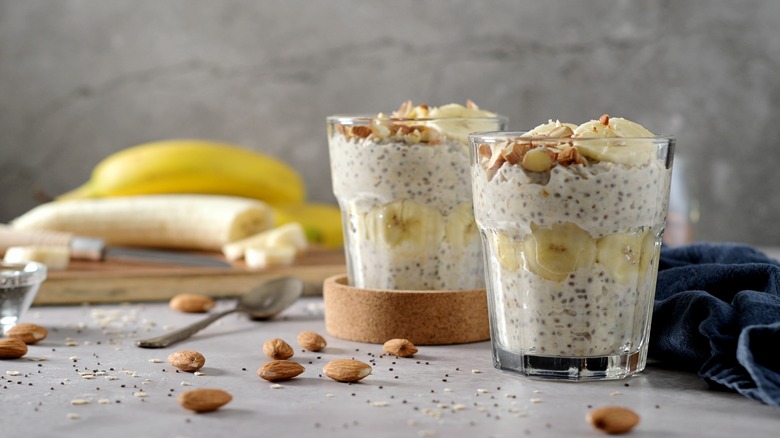What Happens To Your Cholesterol When You Skip Breakfast
We may receive a commission on purchases made from links.
For some people, breakfast might seem like a waste of time when they're rushing in the morning to get to work. If they have breakfast at all, it might be a quick cup of coffee during the commute or a bagel during the morning meeting. People following an intermittent fasting plan might always skip breakfast, opting to wait until much later in the day for the first meal.
Skipping breakfast could lead to an increase in your LDL cholesterol, according to a 2020 meta-analysis in Obesity. Although skipping breakfast could result in weight loss, breakfast skippers' LDL cholesterol was 9 points higher compared to breakfast eaters. However, Dr. Joel Fuhrman, a board-certified family physician and author of "Eat for Life," told Health Digest that skipping breakfast isn't necessarily bad for your heart.
"The body may mobilize your stored lipids (such as fats and cholesterol) when no food is coming in, and this could result in temporary increases in LDL cholesterol," Fuhrman said. "If you start skipping breakfast, this may start to occur during your overnight fast, but this does not mean that this temporary release of stored cholesterol increases cardiovascular risk." However, there are a few things Fuhrman suggests keeping in mind if you choose to skip breakfast.
Healthy choices lower your cholesterol
Fuhrman says that people who make the time for breakfast each morning tend to make healthier food choices not only at breakfast but also at lunch and dinner. Breakfast eaters also tend to be more health-conscious and include exercise as a habit. "People who are less health-conscious may skip breakfast but eat more snacks and junk food," he said. "This could account for the results of observational studies that show better diet quality and health in breakfast eaters."
In a 2013 study in Public Health Nutrition that analyzed the breakfast habits of young adults aged 20 to 39, those who skipped breakfast had more unhealthy cholesterol levels. Compared to people who opted for ready-to-eat breakfast cereals, breakfast skippers were more likely to have obesity, high blood pressure, and elevated insulin levels. Fuhrman says skipping breakfast could lead to people overeating later in the day or making unhealthy choices.
Fuhrman adds that if you make a habit of skipping breakfast, your body adjusts to your eating schedule. Your metabolism becomes temporarily disrupted (and could make it harder to poop) if you change your eating patterns. "Whether you eat breakfast is much less important than which foods you choose to eat for all your meals," he said. "If you're eating greens, other vegetables, berries, and other fruits, beans, mushrooms and nuts and seeds, your diet will be health-promoting whether you consume two or three meals daily, and your cholesterol will improve."
Breakfast tips for people short on time
You don't need to wake up 30 minutes early every day to make a healthy breakfast. However, it might involve a little bit of planning the night before. Overnight oats are a great option for those who are short on time in the morning. One of Fuhrman's recipes for a quick breakfast includes oatmeal, chia seeds, strawberries, walnuts, and plant-based milk. If you forget to make it the night before, you can assemble the ingredients and let them sit for an hour as you make the drive to work.
Fuhrman understands that not everyone feels hungry in the morning, so it might not make too much sense to eat first thing. Your caloric needs depend on your activity level, age, sex, and body size, so you might not feel hungry as often as others. If eating just two meals a day is enough to meet your nutritional needs and satisfy your hunger, Fuhrman says to stick to that eating pattern.
Even if you do skip breakfast before setting out for your day, Fuhrman suggests eating the majority of your calories in the morning and afternoon to align with your circadian rhythms. Your insulin sensitivity is also much higher in the morning than it is in the evening. That means avoiding heavy meals within three hours of bedtime. A heavy dinner right before bed can make it difficult for you to sleep and can be bad for your cardiovascular and metabolic health.


